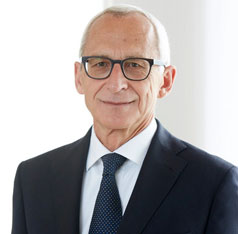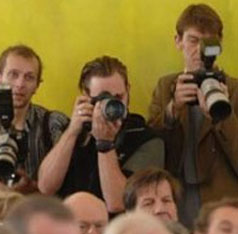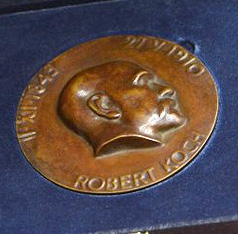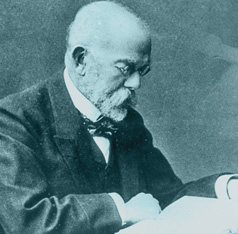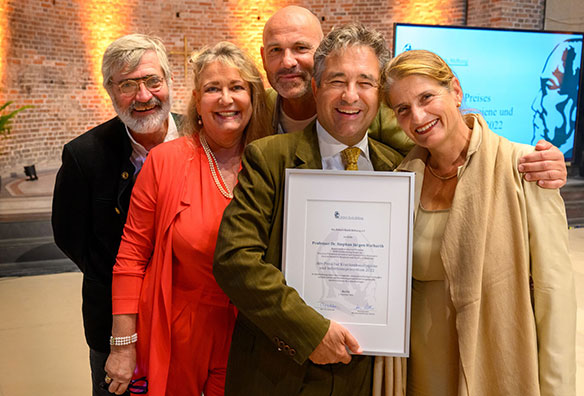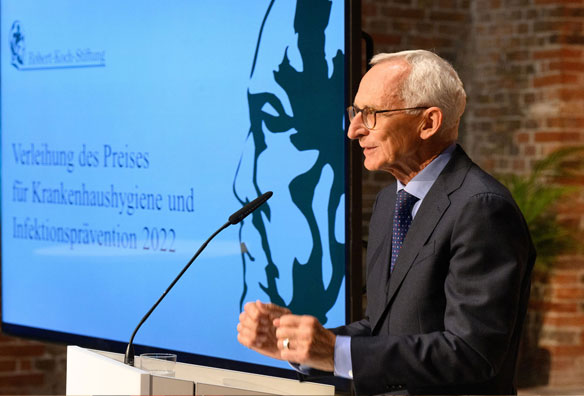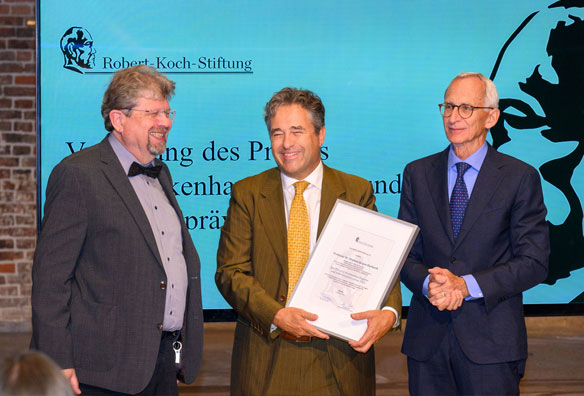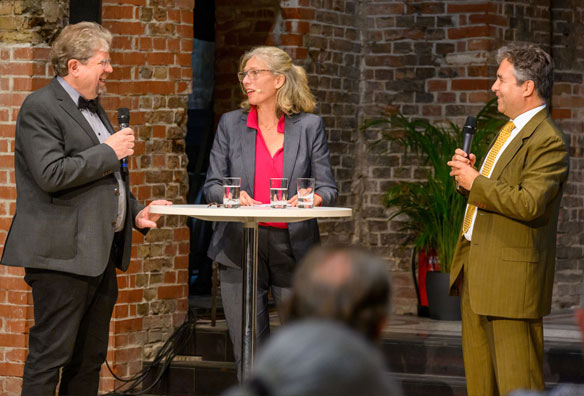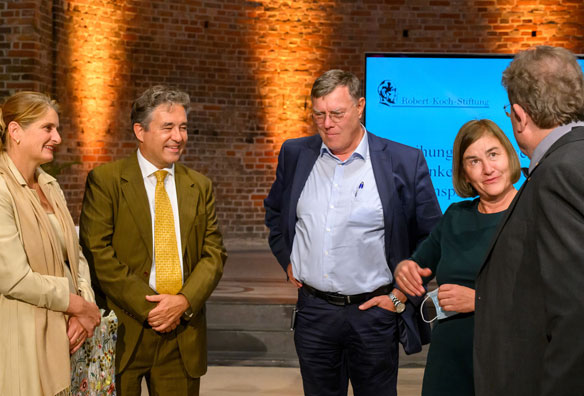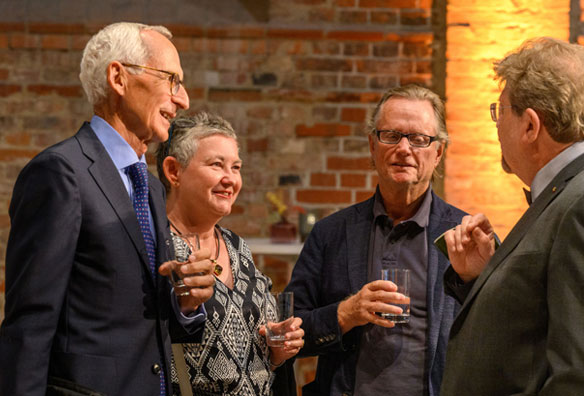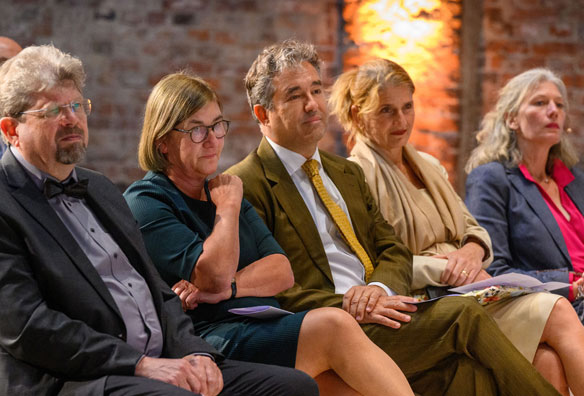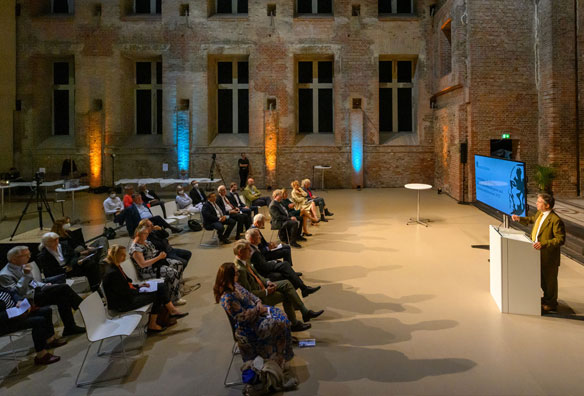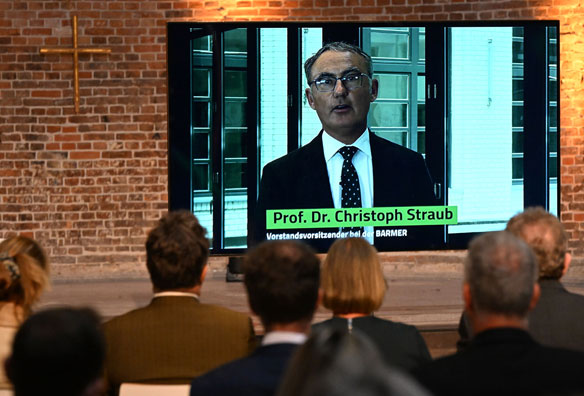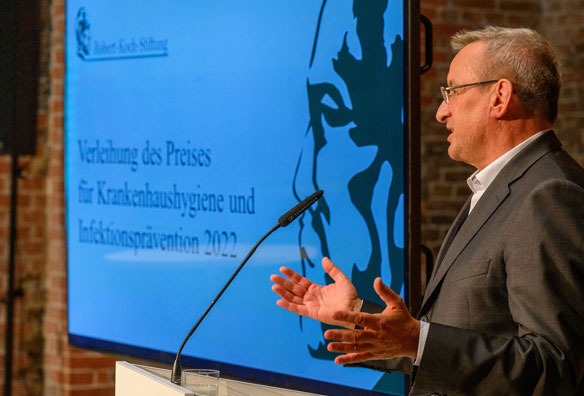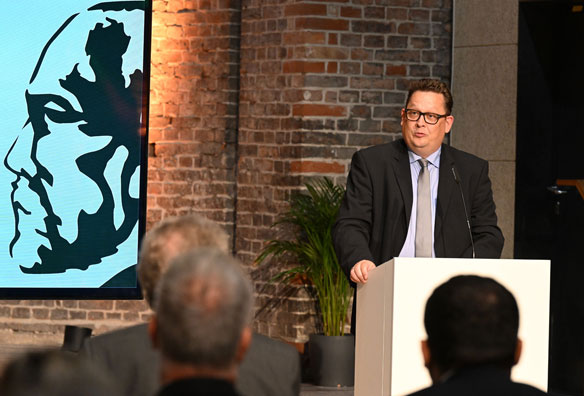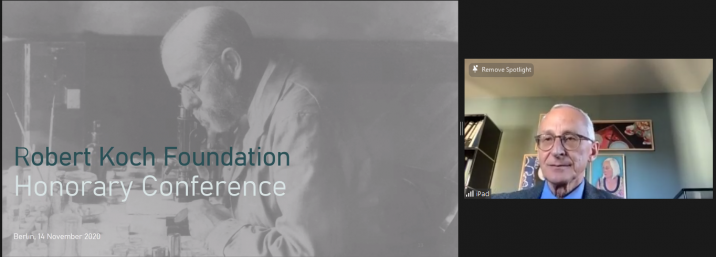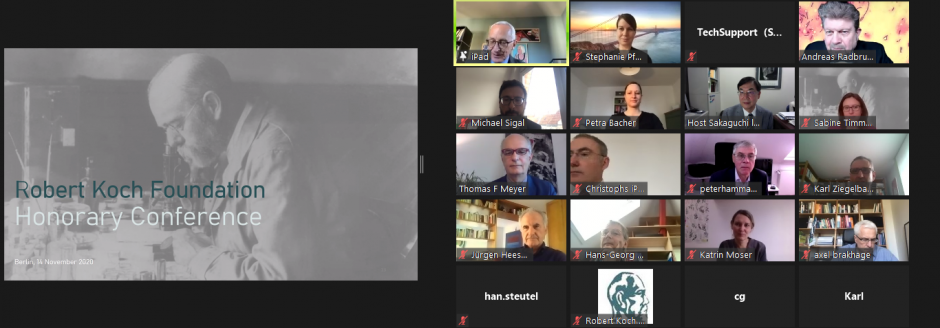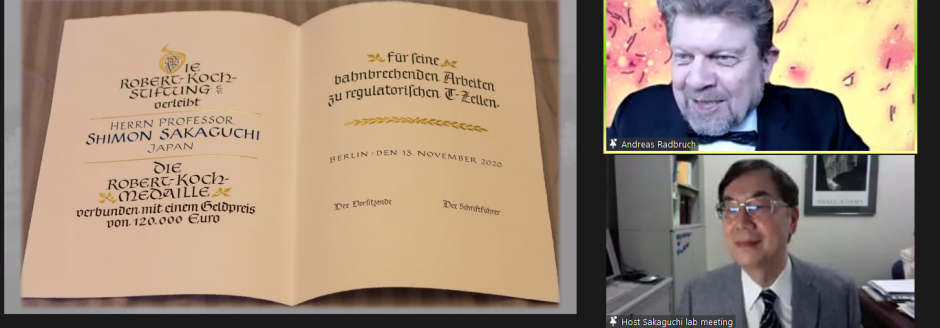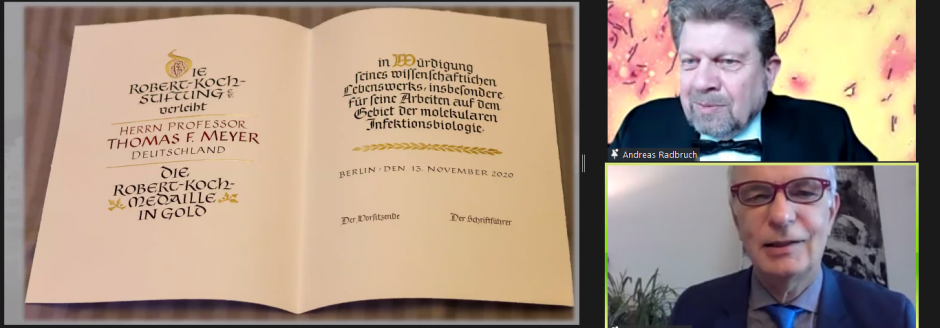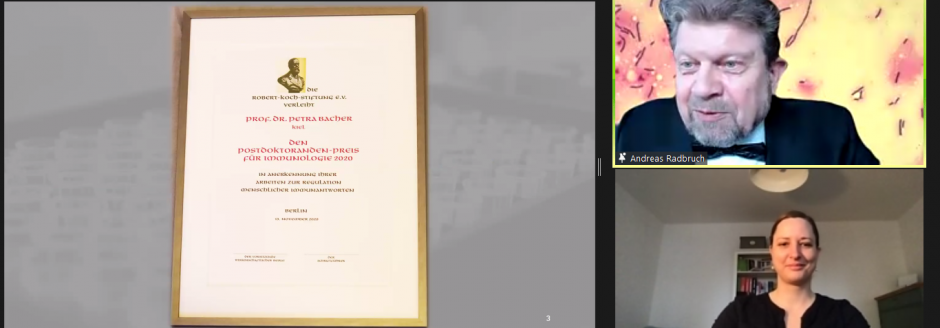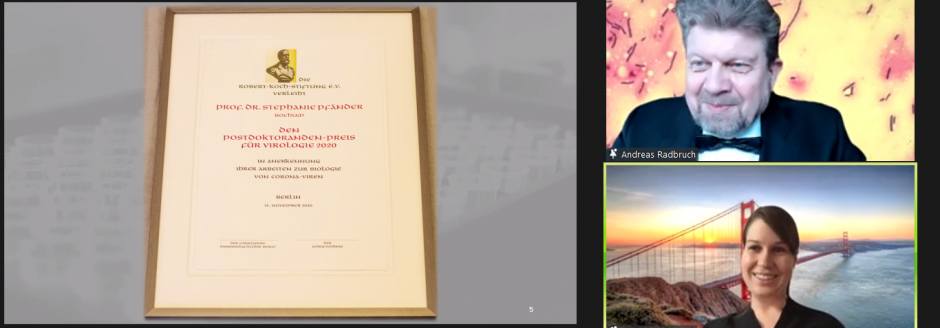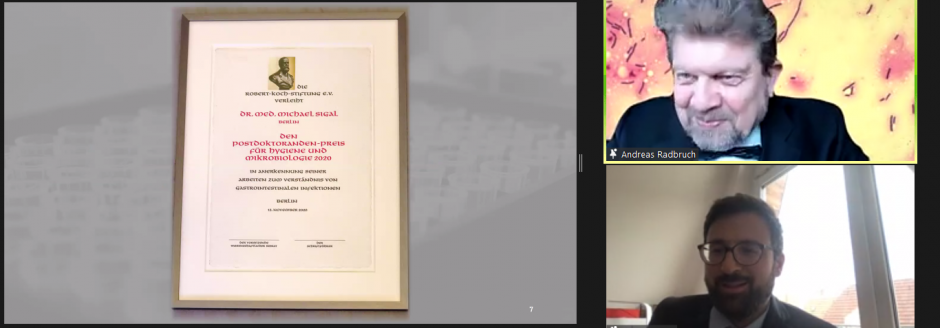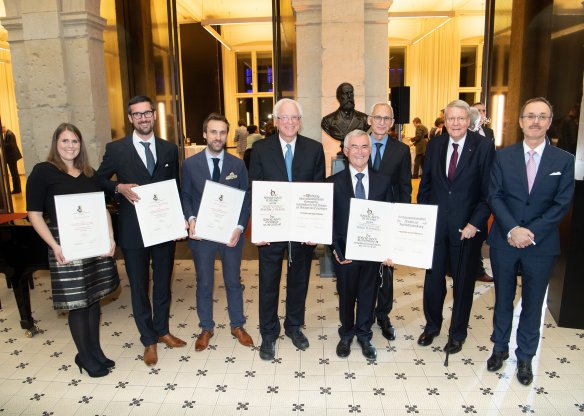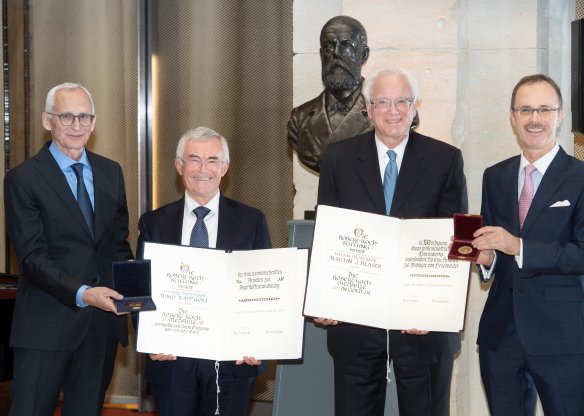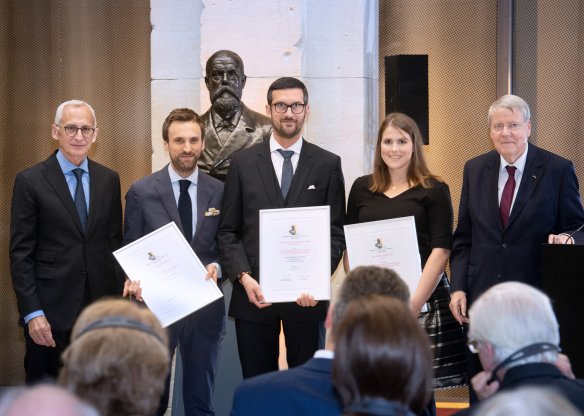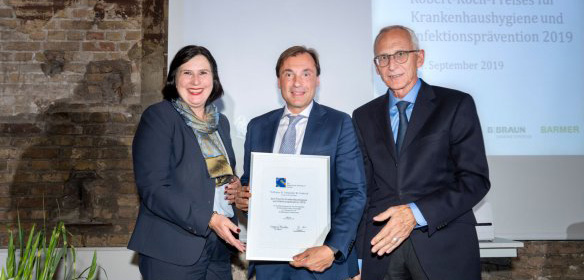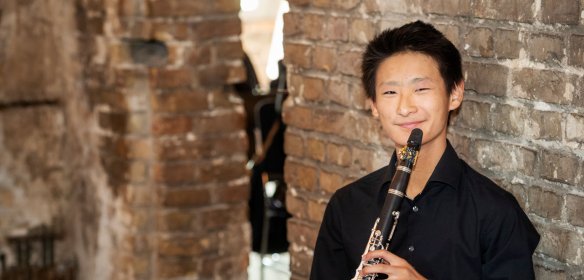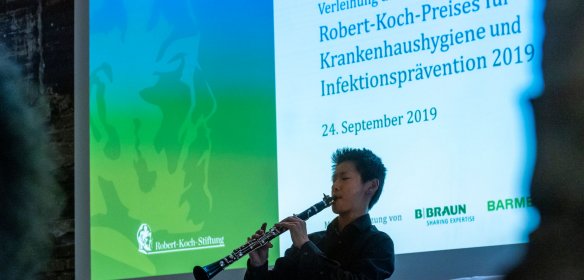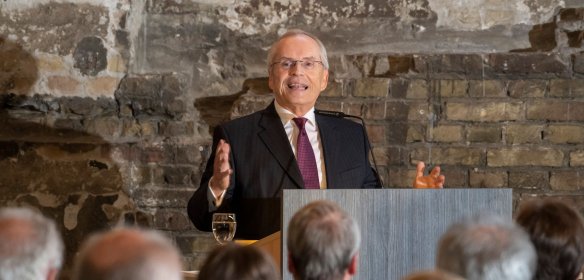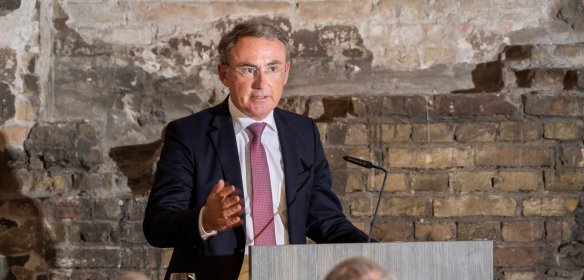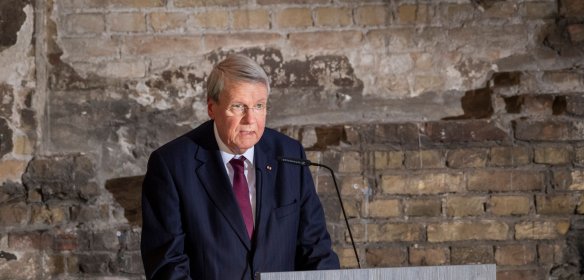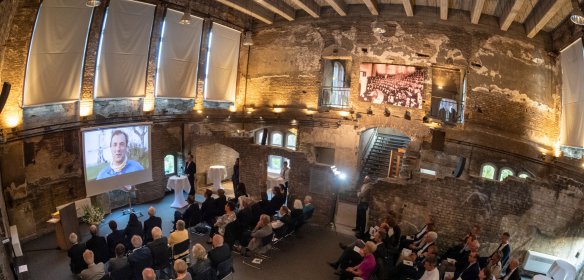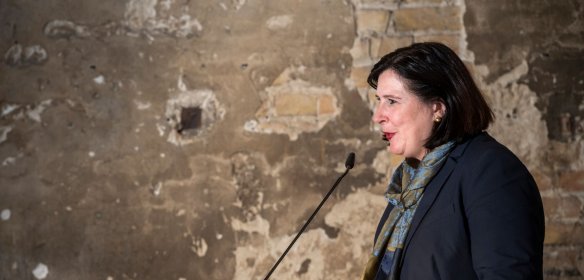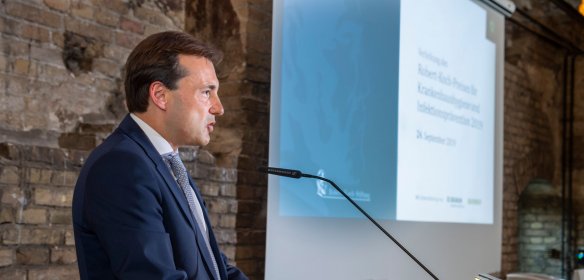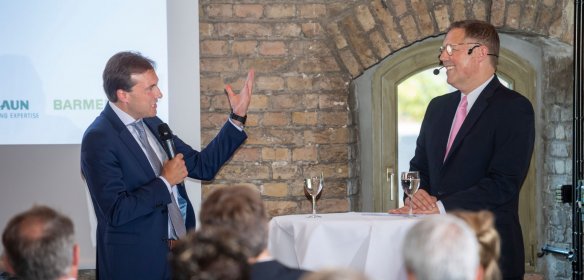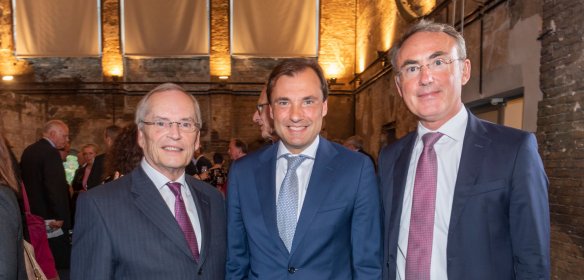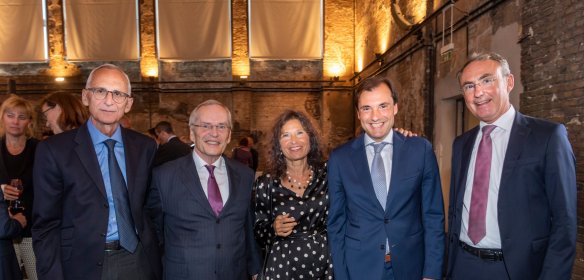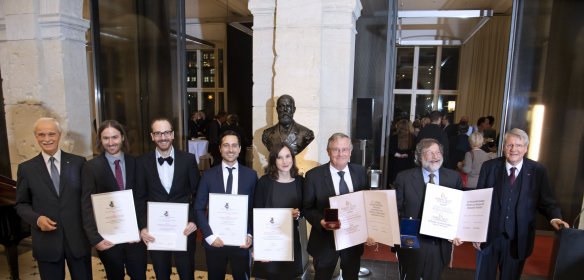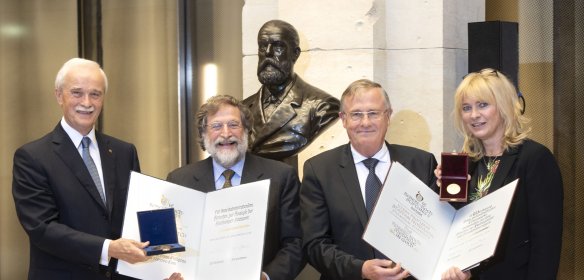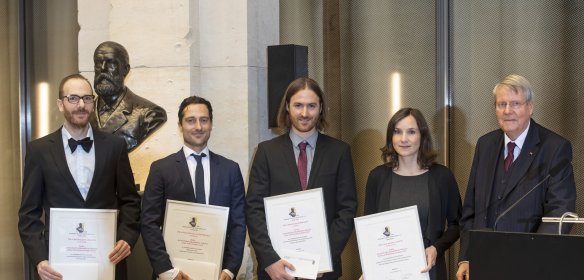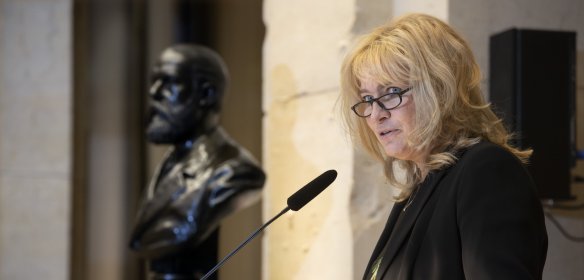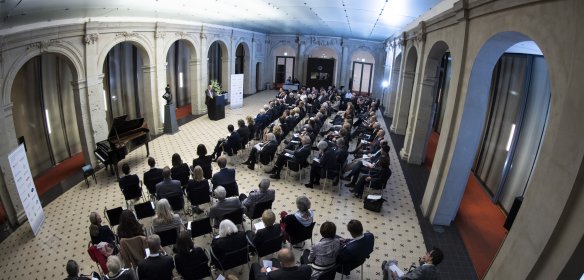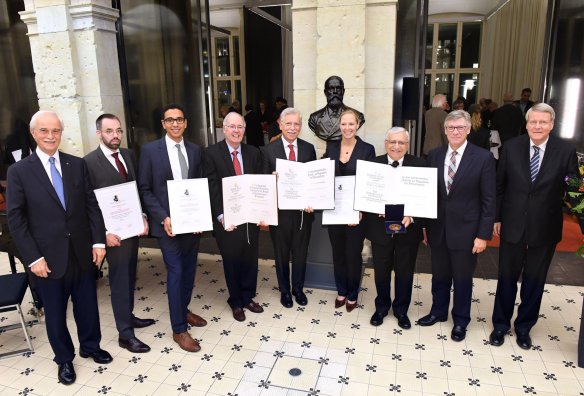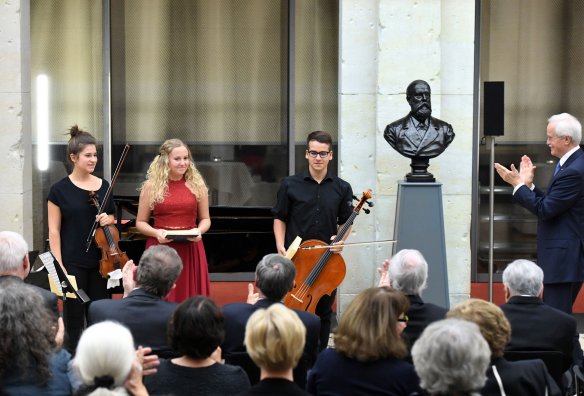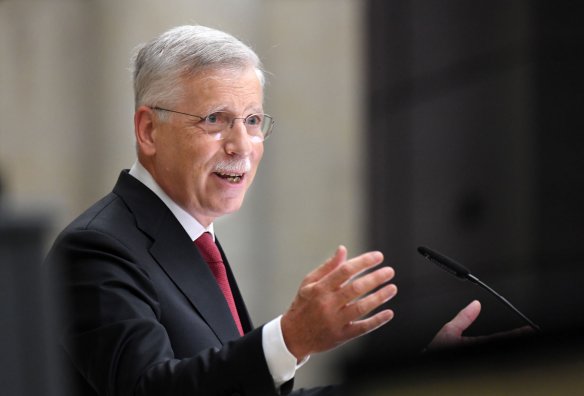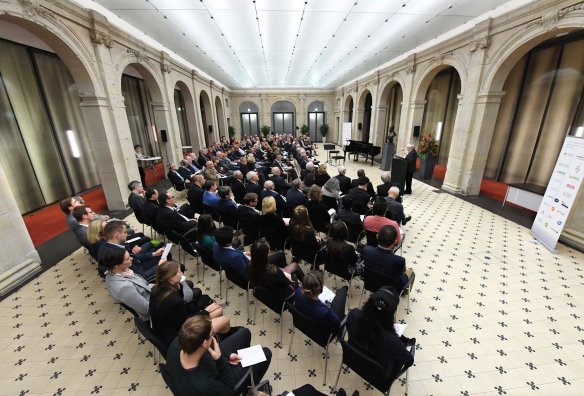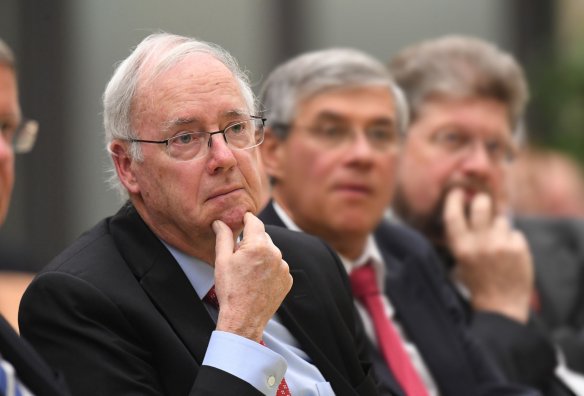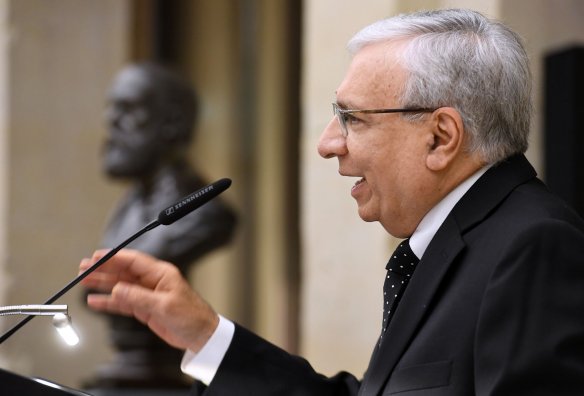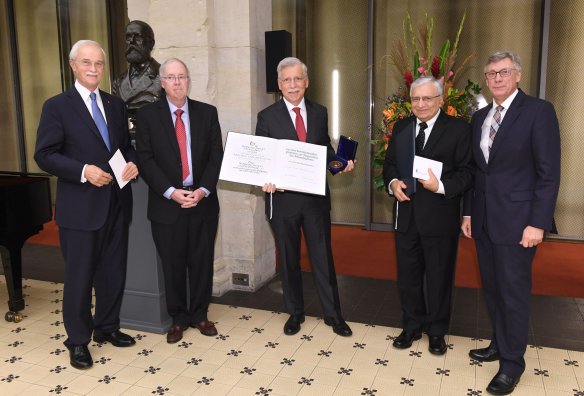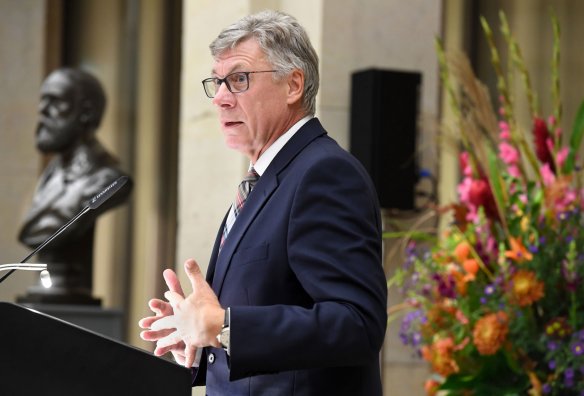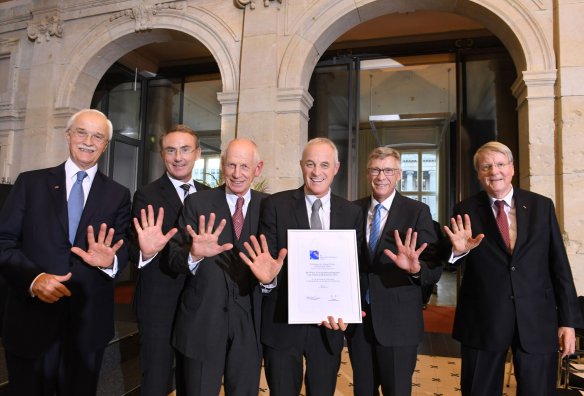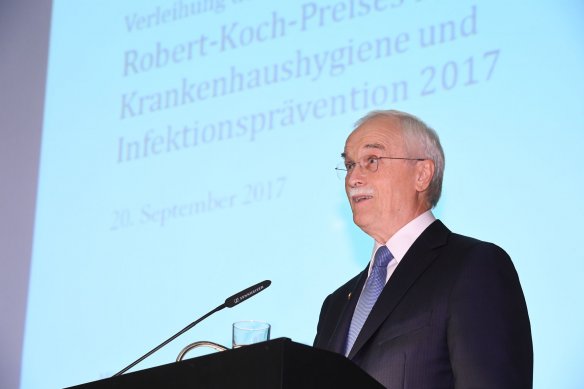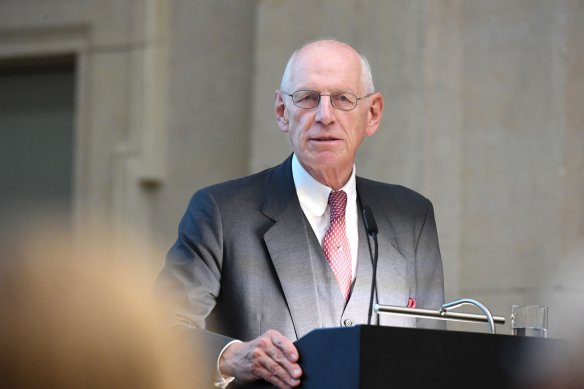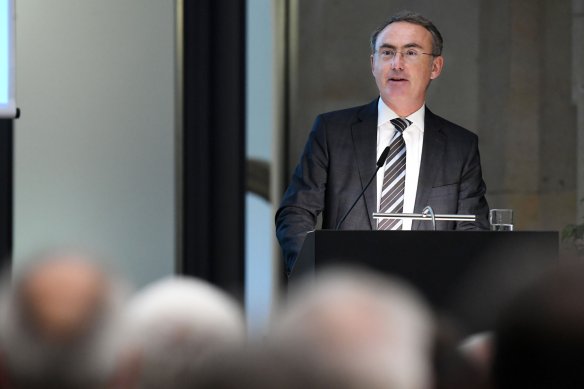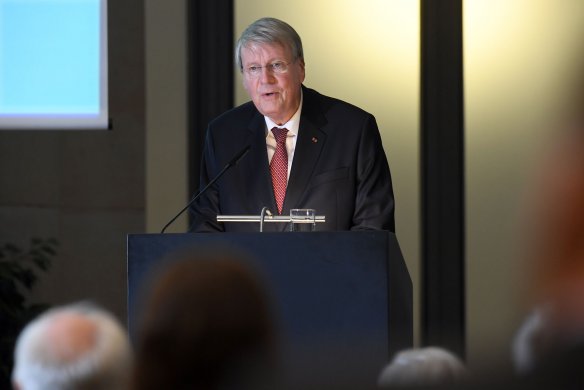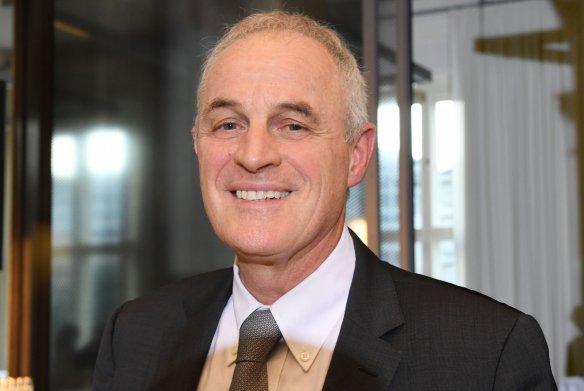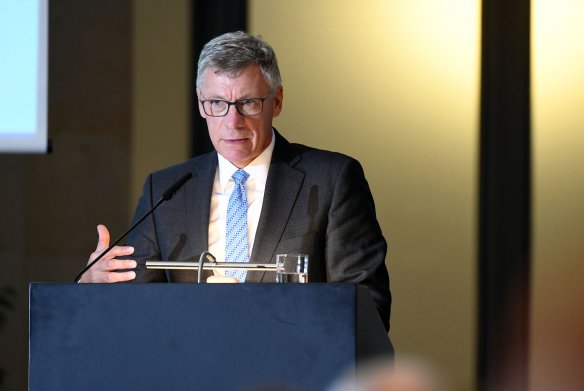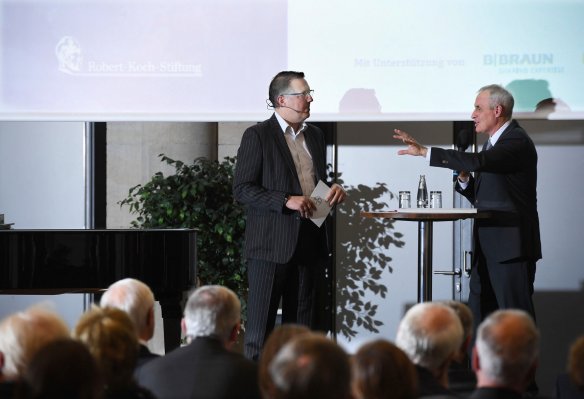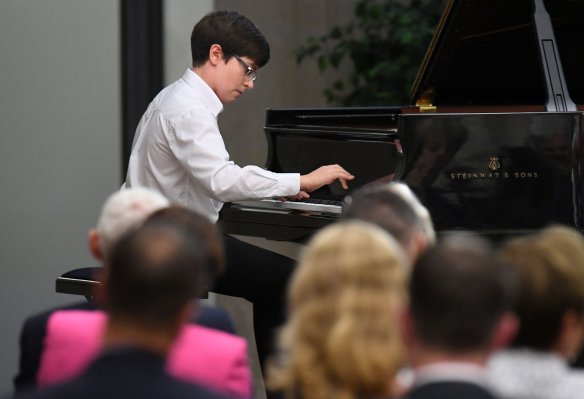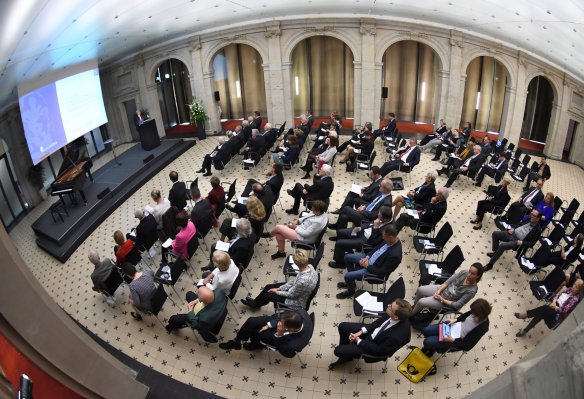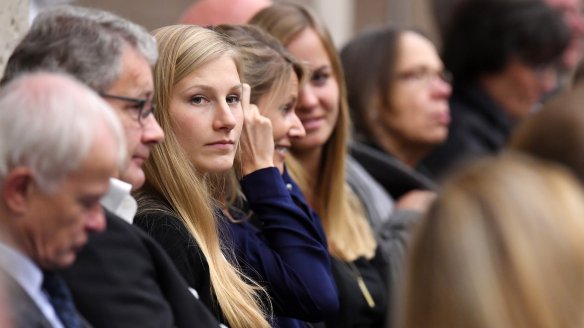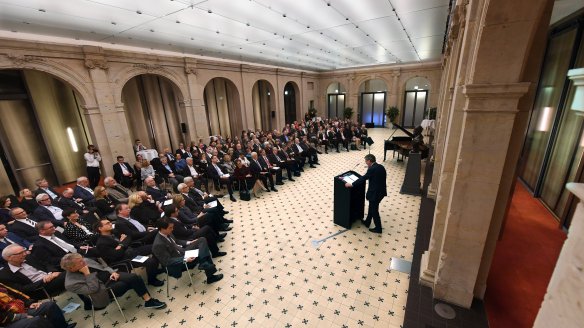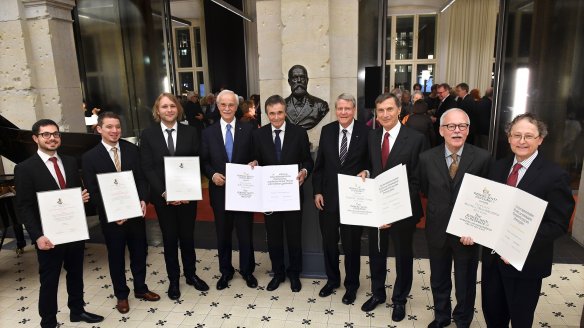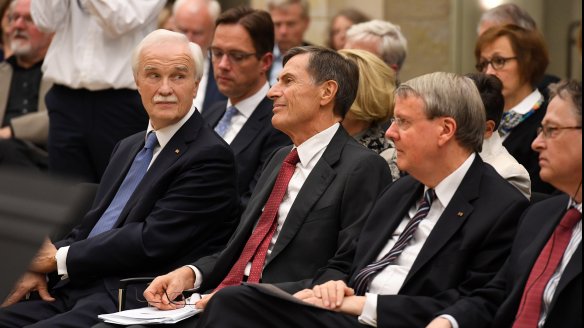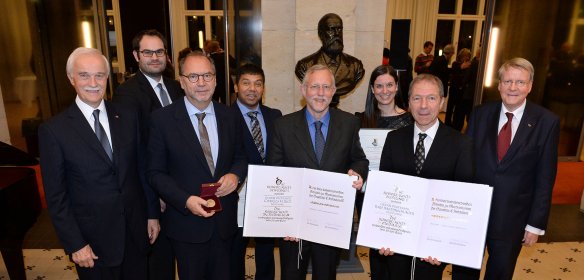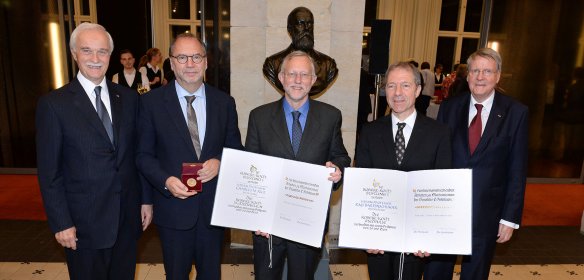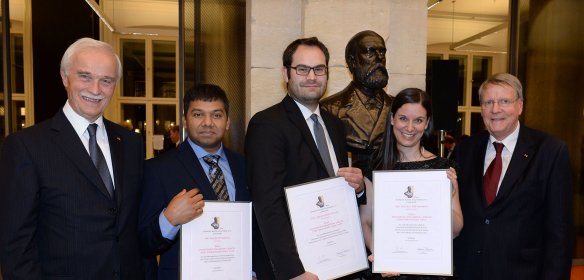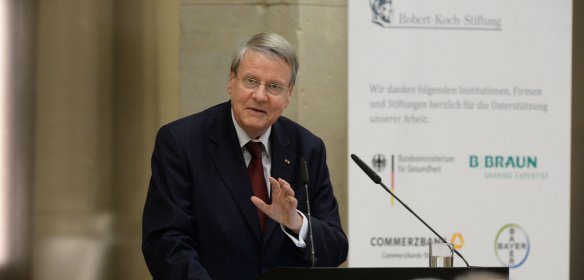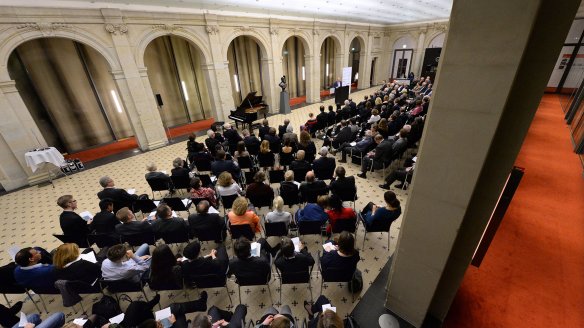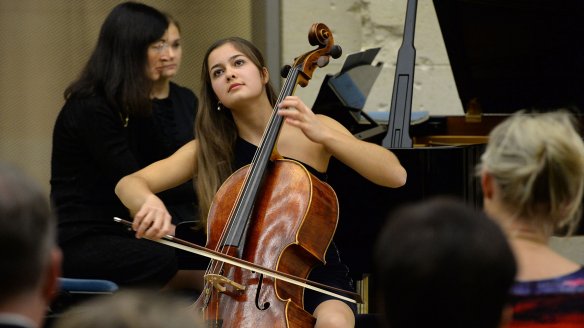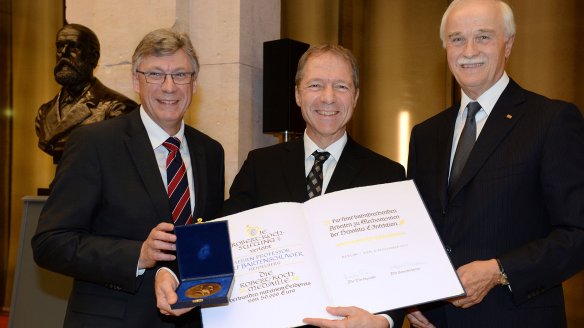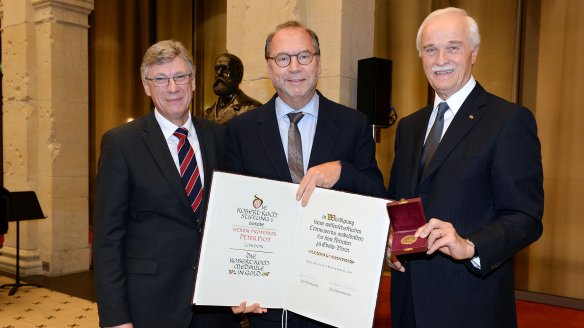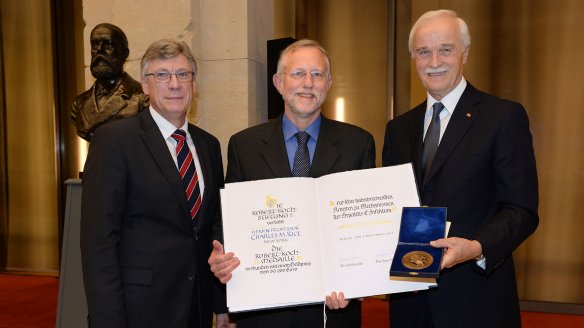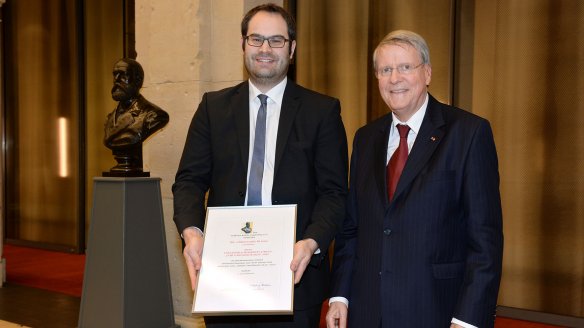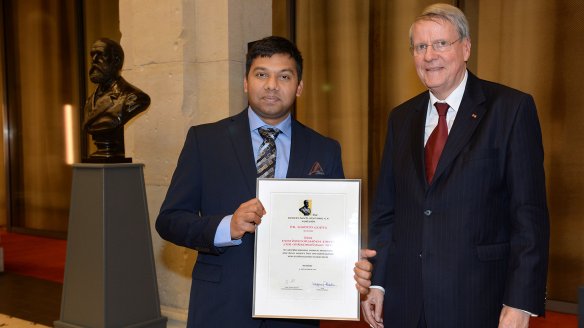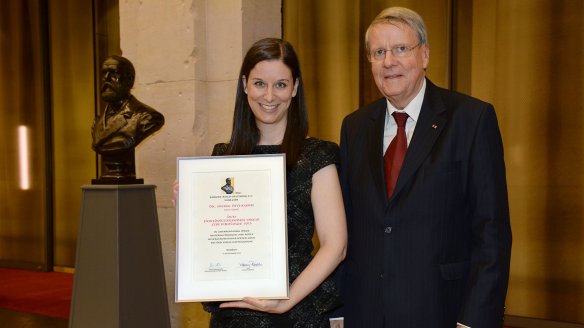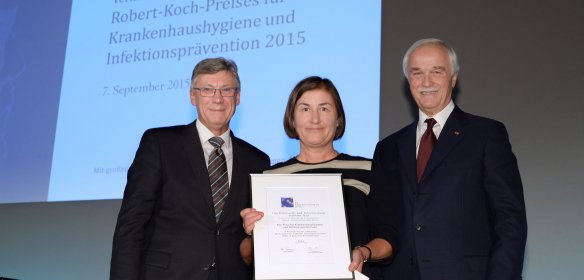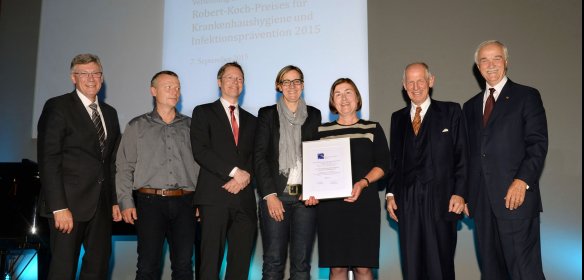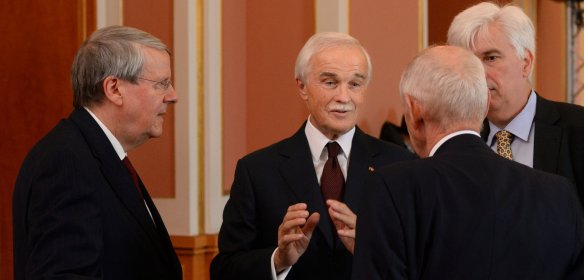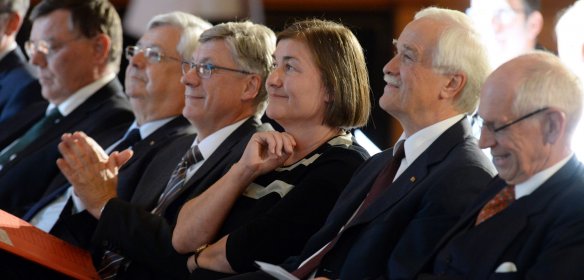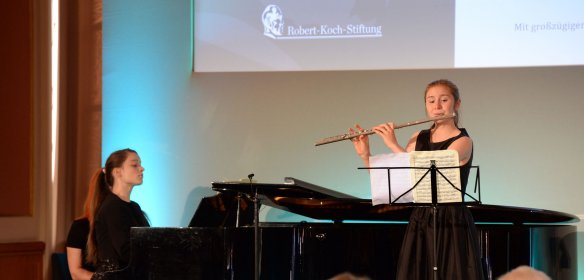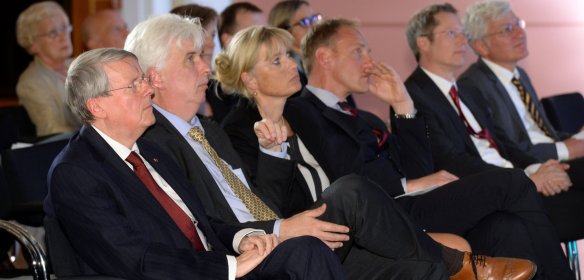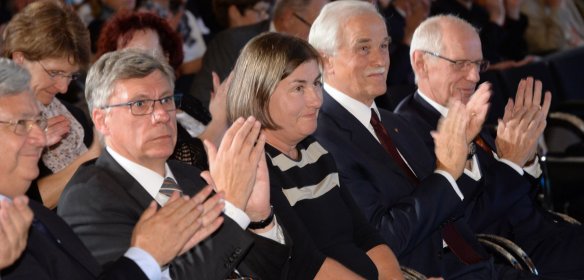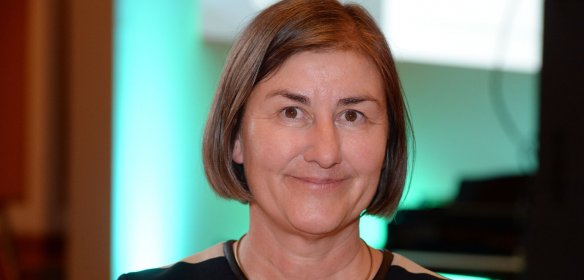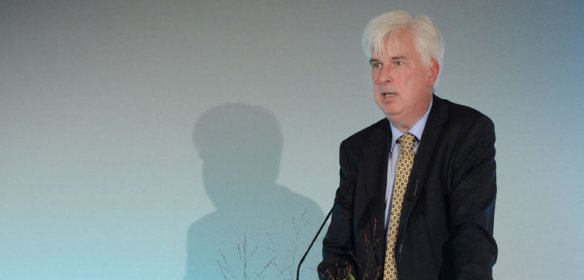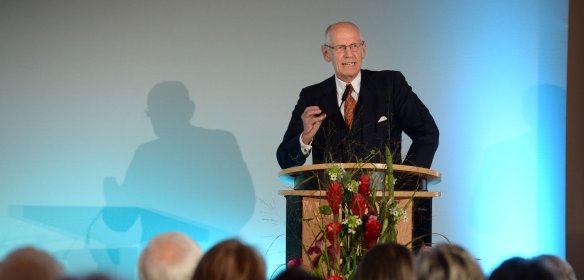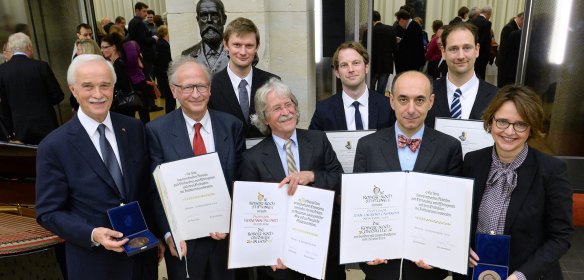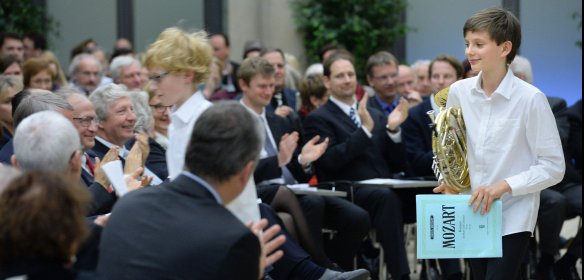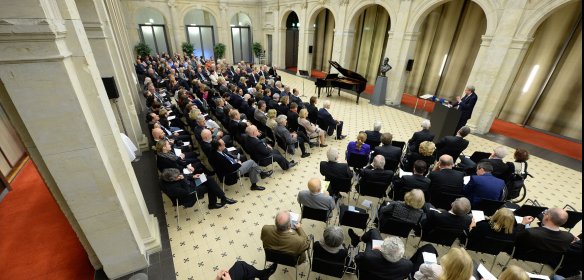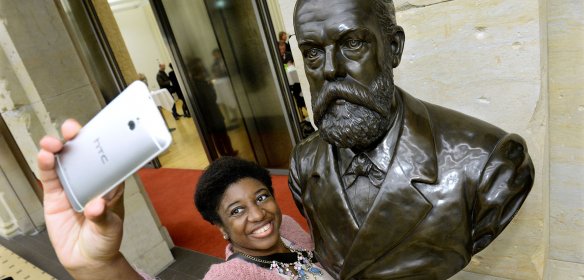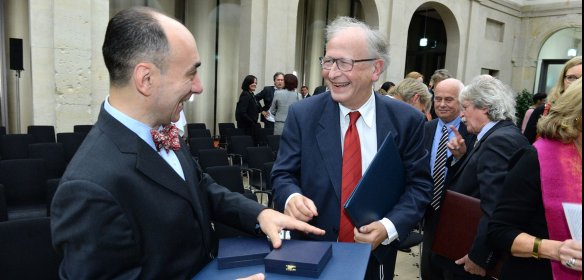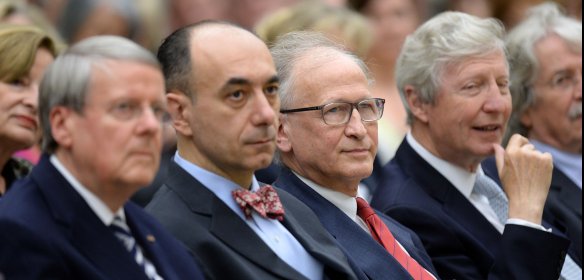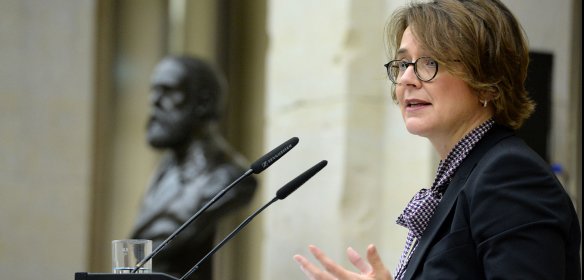Awards
Award ceremonies
Tuesday, 6 September 2022
Prof. Dr Stephan Harbarth has been awarded the Robert Koch Prize for Hospital Hygiene and Infection Prevention 2022, worth 50,000 Euro. In his acceptance speech at the St. Elisabeth Church in Berlin, the Geneva professor with roots in the Allgäu region expressed a clear wish: "Better screening, even of asymptomatic patients, in Germany."FURTHER INFORMATION
Press release
Saturday, 14 November 2020
Last Saturday the Robert Koch Foundation awarded the 2020 Robert-Koch-Prize, with an endowment of 120,000 euros, to Professor Shimon Sakaguchi , Head of Immunology Frontier Research Center (IFReC) at University Osaka (Japan).“Professor Thomas F. Meyer” , senior professor at Christian-Albrechts-University, Kiel (CAU) received the Robert-Koch-Medal in Gold for his lifetime achievement.
Both prizes were handed over by Professor Plischke and Professor Radbruch during a virtual honorary conference. The official festive ceremony at the Berlin-Brandenburg Academy of Sciences and Humanities is postponed to next year.
This year’s Robert-Koch-Prize honours Sakaguchi’s ground-breaking work on regulatroy T-cells.
Professor Thomas F. Meyer received the Robert-Koch-Medal in Gold in particular for his achievemetns in the field of molecular infection biology.
The Post-doctoral Awards for young scientist went to Prof. Dr. Petra Bacher, Institute of Clinical Molecular Biology & Institute of Immunology of the Christian-Albrechts-University zu Kiel, Prof. Dr. Stephanie Pfaender, Dept. f. Molecular and Medicinal Virology, Ruhr-University of Bochum, and Dr. med. Michael Sigal, Charité Universitätsmedizin Berlin.
November 15, 2019
Berlin-Brandenburg Academy of Sciences and Humanities
Berlin – The Robert Koch Foundation today awarded the 2019 Robert Koch Award, with an endowment of 120,000 euros, to Professor Rino Rappuoli, Chief Scientist and Head of External Research and Development (R&D) at GlaxoSmithKline (GSK) Vaccines in Siena, Italy.
Professor Martin J. Blaser, Director of the Center for Advanced Biotechnology and Medicine (CABM) at Rutgers Biomedical and Health Sciences (RBHS), Henry Rutgers Chair of the Human Microbiome and Professor of Medicine and Microbiology at the Rutgers Robert Wood Johnson Medical School in New Jersey (US), was presented with the Robert Koch Gold Medal for his life’s work.
Dr. Thomas Steffen, State Secretary of the Federal Ministry of Health, presented the awards at a ceremony held at the Berlin-Brandenburg Academy of Sciences and Humanities.
Also presented at the ceremony were the Post-doctoral Awards for outstanding work by young scientists, which are each endowed with prize money of 5,000 euros. The candidates were nominated by the German Societies for Hygiene and Microbiology, Immunology and Virology.
Dr. Henning Grüll, Institute of Virology, Cologne University Hospital, received the Post-doctoral Award for Virology in recognition of his work on HIV infection.
Dr. Anna Müller, Institute for Pharmaceutical Microbiology, University of Bonn, received the Post-doctoral Award for Microbiology for her work on anti-infective research.
The Post-doctoral Award for Immunology went to Dr. Daniel Utzschneider, The Peter Doherty Institute for Infection and Immunity, University of Melbourne, Australia, in recognition of his work on T cell immunology.
FURTHER INFORMATION
Laudation Prof. Hacker for the laureates of the Post-doctoral awards for young scientists
Laudation Professor Palese for Professor Rappuoli
Laudatio Prof. Dr. Wieler for Professor Blaser
Acceptance Speech Professor Rappuoli
Acceptance Speech Professor Blaser
September 24, 2019
Lecture Hall Ruin of the Charité Berlin Museum of Medical History
Professor Alexander W. Friedrich, head of the Department of Medical Microbiology and Infection Prevention at the University Medical Center in Groningen (Netherlands) will be awarded the 2019 Robert Koch Foundation Award for Hospital Hygiene and Infection Prevention for his groundbreaking achievements in establishing prevention networks to fight multiresistant pathogens. “With Professor Alexander W. Friedrich, we are honoring an outstanding scientist who is particularly keen to promote international cooperation. His work has made a key contribution towards minimizing healthcare-associated infections and establishing new prevention concepts,” explained Jörg Hacker, Chairman of the Scientific Advisory Council of the Robert Koch Foundation and President of the German academy of natural scientists, the Deutsche Akademie der Naturforscher Leopoldina – Nationale Akademie der Wissenschaften. The award, which is worth 50,000 euros, was presented on Tuesday, September 24, 2019 in the Lecture Hall Ruin of the Charité Berlin Museum of Medical History.
The Robert Koch Award for Hospital Hygiene and Infection Prevention is financially endowed by B. Braun Melsungen AG and BARMER.
November 16, 2018
Berlin-Brandenburg Academy of Sciences and Humanities
Berlin – The Robert Koch Foundation today awarded the 2018 Robert Koch Award, which is worth 120,000 euros, to Professor Jeffrey V. Ravetch from the Rockefeller University in New York, USA. Staffan Normark, Professor at the Karolinska Institutet in Stockholm, Sweden, was awarded the Robert Koch Gold Medal for his life’s work.
The awards were presented by Susanne Wald, Director General at the Federal Ministry of Health, at the Berlin-Brandenburg Academy of Sciences and Humanities.
Also presented at the ceremony were the Robert Koch Foundation Post-doctoral Awards for outstanding work by young scientists, which each come with prize money of 5,000 euros. The candidates were nominated by the German Societies for Hygiene and Microbiology, Immunology and Virology.
The post-doctoral award for virology was awarded to Dr. Maximilian Münchhoff, Max von Pettenkofer-Institute of the Ludwig-Maximilians-University Munich, for his work on the analysis of HIV infections.
Dr. Lisa Beate Maier, European Molecular Biology Laboratory in Heidelberg, received the post-doctoral award for microbiology for her work on the role of the microbiota in bacterial intestinal infections.
This year’s award for immunology was jointly shared by Dr. Christian Mayer, Rockefeller University New York, for his research in the field of adaptive immunity and Dr. Christian Schwartz, Trinity College Dublin, for his research on the immune system against helminths.
FURTHER INFORMATION
Laudation Prof. Dr. Hoffmann for Prof. Ravetch
Laudation Prof. Dr. Hacker for Prof. Normark
Laudation Prof. Hacker for the laureates of the Post-doctoral awards for young scientists
November 3, 2017
Berlin-Brandenburg Academy of Sciences and Humanities
Berlin – The Robert Koch Foundation today jointly awarded the 2017 Robert Koch Award, with prize money of 120,000 euros, to Professors Rafi Ahmed, Emory University and Emory Vaccine Center, Atlanta, USA, und Antonio Lanzavecchia, Institute for Research in Biomedicine, Università della Svizzera italiana, Bellinzona, and ETH Zürich, Switzerland. Christopher T. Walsh, emeritus Professor at the Harvard Medical School in Boston, USA, was awarded the Robert Koch Gold Medal for his life’s work.
The awards were presented by Lutz Stroppe, State Secretary of the Federal Ministry of Health at the Berlin-Brandenburg Academy of Sciences and Humanities.
The award recognizes the two immunologists’ pioneering research on regulation of immune system and their ground-breaking contributions on the development of new vaccines and immunotherapies. In his speech, State Secretary Lutz Stroppe highlighted the work of the award winners: “Professor Rafi Ahmed and Professor Antonio Lanzavecchia have revolutionized our understanding of the body’s immune defenses. The foundation was laid to enable targeted treatments for chronic infections and cancers. Their valuable insights contribute to quality and progress in health care. They want their scientific results to be put into practice quickly, for the benefit of the people. “
Walsh received the Robert Koch Gold Medal for his life’s work as a pioneer in chemical biology and catalyst in the search for pharmacologically active substances, especially for new antibiotics. State Secretary Stroppe remarked: “With his work on im-munomodulators and antibiotics, Professor Christopher T. Walsh has made an ex-ceptional contribution to the development of new substances in the field of ‘chemical biology’.”
Also presented at the ceremony were the Robert Koch Foundation Postdoctoral Awards for outstanding work by young scientists, which come with prize money of 5,000 euros each. The three candidates were nominated by the German Societies for Hygiene and Microbiology, Immunology and Virology.
The post-doctoral award for virology went to Dr. >>Gisa Gerold, Institute for Experimental Virology at TWINCORE in Hanover, for her studies on the biology of Hepatitis C-Virus-Infections. Dr. Médéric Diard, ETH Zürich, received the microbiology award in recognition of his work on the pathogenesis and ecology of enterobacteria. Dr. Ahmed Hegazy, Deutsches Rheuma-Forschungszentrum Berlin, received the immunology award in recognition of his studies on the pathogenesis of chronic diseases.
FURTHER INFORMATION
Laudation Prof. Radbruch for Prof. Ahmed and Prof. Lanzavecchia
Laudation Prof. Hammann for Prof. Walsh
Laudation Prof. Hacker for the laureates of the Post-doctoral awards for young scientists
September 20, 2017
Berlin-Brandenburg Academy of Sciences and Humanities
For his ground-breaking achievements in the promotion of better hand hygiene to prevent nosocomial infections, Swiss medical expert Professor Didier Pittet was today awarded the Robert Koch Foundation Award for Hospital Hygiene and Infection Prevention 2017. Following Professor Helge Karch (Münster) and Professor Petra Gastmeier (Berlin), Pittet, who heads the department for hospital hygiene at the Geneva University Hospitals and is lead advisor of the WHO “Clean Care is Safer Care” program, is the third award-winner of the prize, which was created in 2013, and which is worth 50,000 euros.“
Lutz Stroppe, State Secretary at the Federal Ministry of Health, presented the award at the Berlin-Brandenburg Academy of Sciences and Humanities in Berlin on September 20, 2017: “Hand hygiene in hospitals is of utmost importance when it comes to protecting patients from infection. I am particularly pleased that this year’s hospital hygiene prize is being awarded to the internationally renowned expert Professor Didier Pittet. With his work to improve hand hygiene, Professor Pittet makes an important contribution to strengthening patient safety. “
The Prize is financially supported by B. Braun Melsungen AG and BARMER.
FURTHER INFORMATION
Laudation Prof. Hacker for Prof. Didier
November 4, 2016
Berlin-Brandenburg Academy of Sciences and Humanities
Berlin – The Robert Koch Foundation today jointly awarded this year’s 100,000 Euro Robert Koch Award to Professors >>Alberto Mantovani, Humanitas University, Milan, and Michel C. Nussenzweig, The Rockefeller University/Howard Hughes Medical Institute, New York. Professor Kai Simons of the Max Planck Institute of Molecular Cell Biology and Genetics in Dresden was awarded the Robert Koch Gold Medal for his life’s work. The awards were presented by Annette Widmann-Mauz, Parliamentary State Secretary of the Federal Ministry of Health, on November 4, 2016 at the Berlin-Brandenburg Academy of Sciences and Humanities.
The two immunologists are being honored for their pioneering research work, which has resulted in new treatment options, for example in cancer or in the fight against HIV infections. Through their outstanding research, the laureates lay the foundation for understanding the way in which different immunological mechanisms function. Simons was honored for his lifetime achievements, in particular for his work in modern cell biology.
Parliamentary State Secretary Annette Widmann-Mauz remarked: “The three prize-winners have one thing in common: their research targets the celluar level – the smallest unit of life. The benefits they create, however, have a far greater reach – for mankind and the restoration of good health.”
Also presented at the ceremony were the Robert Koch Foundation Postdoctoral Awards for outstanding work by young scientists, which come with prize money of 5,000 euros each. The German Societies for Hygiene and Microbiology, Immunology and Virology are each entitled to nominate suitable candidates.
The post-doctoral award for virology went to Dr. Jens Bosse, Heinrich-Pette-Institute in Hamburg, for his studies on the pathogenicity of DNA viruses. Dr. Alexander J. Westermann, Institute for Molecular Infections Biology at the Julius Maximilian University in Würzburg, received the microbiology award in recognition of his work on the role and detection of small RNA molecules. Dr. Andreas Schlitzer, Life & Medical Sciences-Institute, Bonn University, received the immunology award in recognition of his studies on the development and differentiation of myeloid cells.
FURTHER INFORMATION
Laudation Prof. Hoffmann for Prof. Mantovani
Laudation Prof. Radbruch for Prof. Nussenzweig
Laudation Prof. Kräusslich for Prof. Simons
Laudation Prof. Hacker for the laureates of the Post-doctoral awards for young scientists
November 6, 2015
Berlin-Brandenburg Academy of Sciences and Humanities
The Robert Koch Foundation today jointly awarded this year’s 100,000 Euro Robert Koch Award to Professors Ralf Bartenschlager, University of Heidelberg, and Charles M. Rice, The Rockefeller University, New York. Professor >> Peter Piot of the London School of Hygiene and Tropical Medicine was awarded the Robert Koch Gold Medal for his life’s work. The awards were presented by Lutz Stroppe, State Secretary of the Federal Minister of Health, on November 6, 2015 at the Berlin-Brandenburg Academy of Sciences and Humanities.
In his speech, State Secretary Lutz Stroppe highlighted the work of the award winners who have made a decisive contribution to improving the health and quality of life of countless people. “The fight against the Ebola epidemic has impressively demonstrated the importance of global cooperation. Science laid the foundation for understanding the mode of action of the virus. This enabled prevention and treatment methods to be developed and ultimately allowed for strategies for assistance on-site to be set. This is why we need scientists like today’s prize winners who, with their curiosity and their enthusiasm, advance research for the benefit of mankind. “
Also presented at the ceremony were the Robert Koch Foundation Postdoctoral Awards for outstanding work by young scientists, which come with prize money of 5,000 euros each. The German Societies for Hygiene and Microbiology, Immunology and Virology are each entitled to nominate suitable candidates.
The post-doctoral award for virology went to Dr. Meike Dittmann, The Rockefeller University, USA, for her research on the role of interferon-stimulated genes in viral pathogenesis. Dr. Nishith Gupta, Humboldt University Berlin, received the microbiology award in recognition of his studies in the field of the metabolism of pathogenic parasites. >> Dr. Christoph Klose, Albert-Ludwigs-Universität Freiburg, received the immunology award for his research into the biology of Innate Lymphoid Cells (ILCs).
FURTHER INFORMATION
Laudation Prof. Palese for Prof. Bartenschlager
Laudation Prof. Palese for Prof. Rice
Laudation Prof. Kaufmann for Prof. Piot
Laudation Prof. Hacker for the laureates of the Post-doctoral awards for young scientists
Monday, September 7, 2015
Berlin City Hall
For her outstanding achievements in the surveillance of nosocomial infections, Professor Petra Gastmeier has been honoured with the “Award for Hospital Hygiene and Infection Prevention” from the Robert Koch Foundation in Berlin. After Professor Helge Karch (Münster), the Head of the Institute of Hygiene and Environmental Medicine at the Charité – Universitätsmedizin Berlin is the second laureate of the award, which was founded in 2013 and comes with a prize of 50,000 euros. “With the establishment of the KISS system for the surveillance of infections in German hospitals, the laureate and her team have played a significant role in improving hospital hygiene throughout Germany,” comments Hubertus Erlen, Chairman of the Board of Directors at the Robert Koch Foundation. The award was presented on Monday, September 7, 2015 in the grand ballroom at Berlin City Hall.FURTHER INFORMATION
Press Release
Laudation
November 14, 2014
Berlin-Brandenburg Academy of Sciences and Humanities
Berlin – This year the Robert Koch Foundation’s €100,000 Robert Koch Award is being equally divided between Professors Jean-Laurent Casanova from Rockefeller University / Howard Hughes Medical Institute, New York, USA, and >> Alain Fischer from the Collège de France and Imagine Institute, Hôpital Necker-Enfants-Malades, Paris, France. The two scientists are being honored for their groundbreaking work on understanding host genes and their products in infectious diseases. Emeritus Professor >> Hermann Bujard from the Centre for Molecular Biology at Heidelberg University is being awarded the Robert Koch Gold Medal for his life’s work, in particular for his research on malaria infections.
Also presented at the ceremony were the Robert Koch Foundation Postdoctoral Awards for outstanding work by young scientists, which come with prize money of 5,000 euros each. The German Societies for Hygiene and Microbiology, Immunology and Virology are each entitled to nominate suitable candidates. Dr. rer. nat. Dr. rer. nat. Tim Lämmermann, Bethesda, USA, received the immunology award for his research into the analysis of the migration of immune cells. Dr. Dr. Benedikt B. Kaufer, Berlin, received the Microbiology Award in recognition of his studies on the analysis of virus-associated tumors. The post-doctoral award for virology went to Dr. Dr. Kai Papenfort, Princeton, USA, for his research on the role of regulatory RNA molecules in pathogens.
Annette Widmann-Mauz, state secretary of the Federal Minister of Health, highlighted the work of the award winners, who are leading the fight against infectious diseases in the service of science.“How important this fight is and how big the challenges are in providing promising treatment methods is demonstrated especially in times of Ebola. This is why research in this field remains a paramount need.”
FURTHER INFORMATION
Welcome address by Dr. Hubertus Erlen
Laudation Prof. Hoffmann für Prof. Casanova
Laudation Prof. Hoffmann for Prof. Fischer
Laudation Prof. Hengge for Prof. Bujard
Laudation Prof. Hacker for the laureates of the Post-doctoral awards for young scientists

